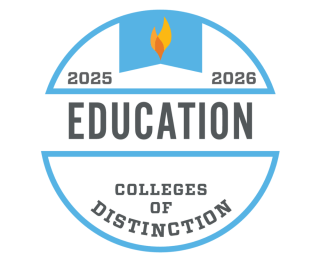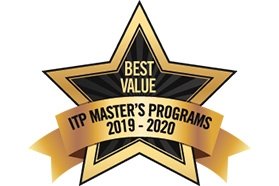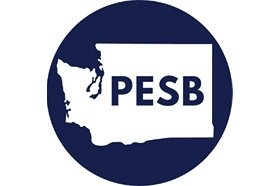
Master in Teaching
Saint Martin's University's Master in Teaching (MIT) program provides the opportunity to simultaneously earn your teacher certification and a master's degree. Certifications may be obtained in the areas of elementary education and secondary-level content areas, such as biology, chemistry, and special education. Employees in partner districts may also earn their MIT as part of our Grow-Your-Own program, which helps current paraeducators earn their teaching certificate, special education endorsement, and master’s degree all while maintaining their district employment.
Jump to
Why Saint Martin's University?

- The MIT program at Saint Martin’s is designed to meet the needs of working adults. Our two-year timeline and eight-week course structure mean that you will only have class two evenings per week, allowing you to pursue your education while still being able to live your life.
- An education degree from Saint Martin's University opens doors because of the stellar reputation of our program and our graduates.
- Saint Martin’s partners with more than 30 school districts in the South Puget Sound area to provide you with meaningful field placements that meet both the requirements of state certification and the unique learning needs of adult pre-service teachers. Our university field supervisors will walk alongside you in the classroom, ensuring that you receive the support you need to thrive both as a learner and as a teacher.
Priority deadline
The MIT program starts in the fall only. Apply by July 15 to guarantee your spot.
What your degree journey will look like
You’ll spend the first year of the program building a strong foundation in the basics of lesson planning and curricular design, learning how to design and adapt instruction for a wide-variety of learners.
In the second year, you’ll deepen your content-specific instructional skills by complementing your coursework with a year-long field experience that grows in time and responsibility until you are taking over a classroom of your own.
Core theory and foundations courses are taught by full-time professors who are experts in their fields. Our methods courses, on the other hand, are generally taught by fully-qualified K-12 teachers who spend their days doing the hands-on work that they teach about in the evenings.
What you'll get with an MIT degree:
Graduates of the Saint Martin's MIT program walk away with:
- WA state teaching certification
- An initial subject-matter endorsement
- A master’s in teaching degree
All graduates will be qualified to work in any K-12 public school in the state and can begin their career higher up the teacher pay scale.
Ready to start your journey? Choose the pathway that is right for you:
| Details | Traditional MIT pathway | Grow-Your-Own (GYO) pathway | 4+1 pathway |
|---|---|---|---|
| Timeline | 2 years | 1 year (+summer) | 5 years (undergrad + MIT) |
| Content areas | Elementary and Secondary | Special Education | Secondary |
| Who it's for | General public | Paraeducators in partner districts | Current Saint Martin's undergraduates |
| Pre-requisites | General BA/BS (Elementary) Content-specific BA/BS (Secondary) | General BA/BS | Specific to each major |
Master in Teaching Requirements
General requirements
All MIT applicants must have a completed bachelor's degree from an accredited university before starting program courses. Applicants who are still completing their degrees may apply, but the degree must be completed and final transcripts must be submitted before the first day of classes.
All MIT applicants must have an overall undergraduate GPA of 3.0.
All MIT applicants must have Pacific Northwest History and Professional Issues and Abuse (or their equivalents) documented on official university transcripts, as per state law. These courses may be taken from your home institution, a community college, or from Saint Martin's. These courses must be completed before graduation and certification. If these courses have already been taken and passed and are transcripted, they do not need to be retaken.
Endorsement requirements
State law requires that pre-service teachers meet specific endorsement competencies. These competencies are assessed through a combination of university transcripts and endorsement-specific testing.
Candidates in the Saint Martin's MIT program have three options for demonstrating endorsement competencies:
| MIT pathway | Endorsement | Degree requirements | GPA requirements | Testing requirements | Endorsement course requirements |
|---|---|---|---|---|---|
| Option 1 Degree + Test | Secondary | Bachelor's degree in endorsement area (e.g. Math or History) | 3.0 minimum overall 3.0 minimum in major courses | Take and pass endorsement content exam before beginning program courses | None |
| Option 2 Degree + Test | Elementary and Special Education | Bachelor's degree is Psychology, Early Childhood Education, or their equivalents | 3.0 minimum overall 3.0 minimum in major courses | Take and pass endorsement content exams before beginning program courses | None |
| Option 3 Transcript analysis + Test | Any | Bachelor's degree in any subject | 3.0 minimum overall | Take content exam(s) before beginning student teaching | Dependent on results of transcript analysis |
Applicants who choose options 1 and 2 and do not pass the endorsement exam before beginning program courses will be automatically moved to option 3 and may be required to take additional courses during future program semesters or during summer.
The number of credit hours required for the Master in Teaching degree varies depending on which endorsement is being pursued. The credit hours do not include prerequisite courses:
Elementary Education: 32 credits
Secondary Education: 29 credits
Special Education (GYO pathway only): 30 credits
Elementary and Secondary Education - traditional MIT pathway
Prerequisites
- MED 562: Professional Issues & Abuse (1 credit)
- MED 514: PNW History (2 credits)
Fall 1
- MED 506: Planning & Assessment (2 credits)
- MED 559: Introduction to Exceptionalities (2 credits)
- MED 525: Issues and Trends in ELL & Bilingual Ed. (2 credits)
- MED 564: Literacy Practices for K-8 Learners* (2 credits)
- MED 568: Secondary Literacy** (2 credits)
Spring 1
- MED 512: Assistive Technology for All Learners (2 credits)
- MED 518: Critical Narratives & Historical Integrations (2 credits)
- MED 551: STEM Integrations* (2 credits)
- MED 539: Literature & Arts Integrations* (2 credits)
- MED 584/5: Secondary Methods** (2 credits)
- Either MED 584: Secondary Humanities Methods -OR- MED 585: Secondary STEM Methods, depending on endorsement needs
Fall 2
- MED 517: Health & Fitness Approaches* (1 credit)
- MED 561: Instructional Strategies for All Learners (2 credits)
- MED 588: Action Research in the Classroom++ (2 credits)
- MED 592: Methods Practicum (2 credits)
Spring 2
- MED 594: Student Teaching Internship (5 credits)
- MED 598: Student Teaching Seminar (2 credits)
- MED 589: Action Research Capstone++ (2 credits)
* Elementary pathway only
** Secondary pathway only
++ MIT Graduate Core
Special Education - Grow Your Own (GYO) pathway
Prerequisites
- MED 514: PNW History (2 credits)
Summer
- MED 506: Planning & Assessment (2 credits)
- MED 559: Introduction to Exceptionalities (2 credits)
- MED 525: Issues and Trends in ELL & Bilingual Ed. (2 credits)
- MED 562: Professional Issues & Abuse (1 credit)
Fall
- MED 592: Methods Practicum (2 credits)
- MED 567: Special Education Law/Issues of Abuse/IEP (2 credits)
- MED 561: Instructional Strategies for All Learners (2 credits)
- MED 588: Action Research in the Classroom++ (2 credits)
Spring
- MED 512: Assistive Technology for All Learners (2 credits)
- MED 565: Transitions to Adulthood for Special Populations (2 credits)
- MED 563: Management Strategies for Exceptional Learners (2 credits)
- MED 594: Student Teaching Internship (5 credits)
- MED 598: Student Teaching Seminar (2 credits)
- MED 589: Action Research Capstone++ (2 credits)
++ MIT Graduate Core
Federal aid
Federal financial aid is available for graduate students who will be enrolled at least half time and are citizens, or eligible non-citizens, of the USA. Most federal aid for graduate students is in the form of direct loans.
For more details about federal aid eligibility and the different types of aid available for graduate and professional studies visit studentaid.gov.
Graduate Assistantships
Saint Martin’s University offers a limited number of Graduate Assistantships to graduate students. For assistance regarding graduate assistantships, please contact your graduate program director.
What are the differences between the MED and the MIT program?
The MED program is designed for educators who already have a teaching credential and are looking for a master's degree to further develop their skills and knowledge. The MIT is designed for those looking to become certified as teachers who would also like to earn a master's degree.
Can credits from another university be transferred to the MIT program?
Up to two courses of graduate work may be taken at another institution and transferred, provided the work fits the program plan, is recommended by the program advisor and is approved by the director of master's programs in education. Students applying for admission to the program may request to have prior graduate study considered for transfer into the program.
I have a job that required me to have a fingerprint clearance, do I still need to obtain my fingerprints?
If you work in a school district and you think the OSPI already has a fingerprint clearance in their database for you (they must not be older than 2 years) we would be happy to check. Just let us know.
Once my application is complete, about how long does it take for an admission decision?
For the MIT program, once your application is complete, it goes to a faculty committee for review. We advise applicants that admission decisions can take up to one month.
When are classes offered?
Classes for the MIT program are typically offered in the late afternoon or evenings.
Master in Teaching at a Glance
- Degree
- Master
- Program Type
- Master’s Degree
- Campus
- Main (Lacey)
- Type of Instruction
- In Person

 Academic Excellence
Academic Excellence
 Community
Community









